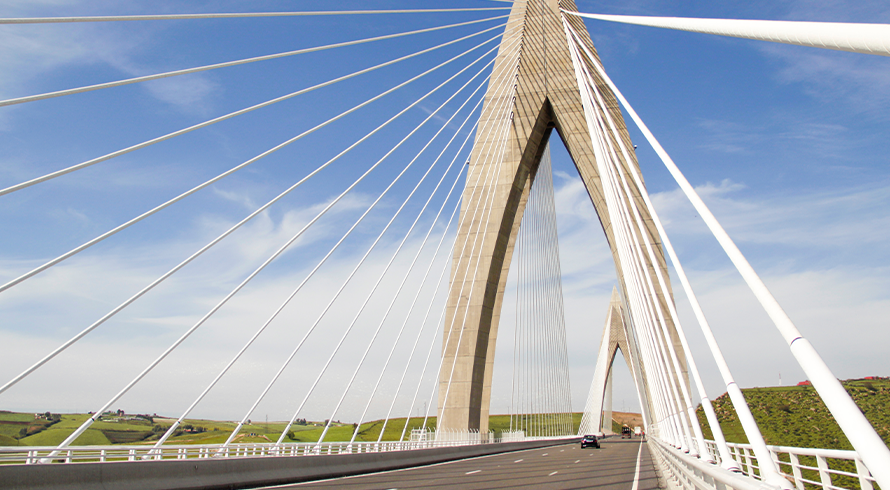2016 Budget Speech review: projects and infrastructure
Overview of Infrastructure Investment
In accordance with the NDP, investment in infrastructure has to be enhanced and sustained to promote economic growth and address the spatial inefficiency and fragmentation of the apartheid landscape. To this end, R870 billion has been allocated to the public sector infrastructure programme over the next three years. The public sector infrastructure programme encompasses energy, transport and logistics infrastructure, housing subsidy initiatives, health and education facilities as well as investment in water and sanitation infrastructure.
Energy
The development of an affordable and reliable supply of electricity is essential for economic growth, the effective running of the country and the maintenance of a quality standard of living for the population. Government has accordingly allocated R70 billion to energy investment for 2016 and over R180 billion for the next three years.
R155.3 billion of this total amount will be allocated to Eskom to facilitate the completion of the Medupi, Kusile and Ingula power plants. Approximately R17.6 billion will go towards the Integrated National Electrification Programme in 2016/17 and 2018/19 to provide 840 000 households with access to on-grid electricity. Spending on national non-grid solar electrification programmes with a target of 70 000 connections over the medium term will increase from R166.4 million in 2016/17 to R201.6 million in 2018/9.
Government’s Clean Energy Programme envisages that R1.2 billion will be spent on 131 146 solar water heating units while R603.9 million has been allocated over the medium term for subsidies for the installation of energy efficient public lighting and retrofitting energy efficient technology in municipal buildings to save municipalities 500GWh of energy per year.
Government has also confirmed that the Independent Power Producer Programme will be extended to include coal and gas power projects as a result of the success achieved in the renewable energy initiatives.
Transport and logistics infrastructure
Transport and logistics infrastructure accounts for approximately R292 billion of the national budget over the next three years. R77 billion has been allocated to Transnet for the acquisition of 232 diesel locomotives for its general freight business and 100 locomotives for its coal lines.
It is also envisaged that the National Treasury will provide the Passenger Rail Agency of South Africa with R46.6 billion in capital transfers for trainsets for Metrorail and upgrades of Metrorail and Shosholoza Meyl.
Further, approximately R6 billion will go towards extensions to the bus-rapid transit systems in the Ekhurhuleni, eThekwini, Johannesburg, Tshwane, Cape Town and George areas. R3.7 billion has been allocated to the upgrading of the Moloto Road with an additional R18 billion being spent on bus rapid transit projects in cities and the refurbishment of over 1700 Metrorail and Shosholoza Meyl Coaches.
Government further confirmed that these transport initiatives are associated with 90 integrated land development projects which will involve private sector partnerships and will be valued at more than R130 million.
Health, welfare and education infrastructure
In relation to health and welfare services, the budget allocated R4.5 billion over the medium term for revitalising health facilities in eleven NHI pilot districts and related health system reforms. Additional funds are allocated for new substance-abuse treatment centres in the Northern Cape, Free State, Western Cape and North West Provinces.
In terms of education, the 2016 budget marks an increase in expenditure from R204 billion to R254 billion in 2018/2019. By 2018, 510 schools will be rebuilt whilst 1120 schools will be supplied with water and 916 schools supplied with electricity.
Water and sanitation
The NDP notes that expanding access to water requires investments all along the supply chain, starting with investments in dams, bulk water supply schemes and wastewater infrastructure. Government indicated that budget allocations for water infrastructure will demand special attention this year due to the drought and the need to address water loss in critical supply networks. The Regional Bulk Infrastructure Grant Programme has been allocated R15 billion over the medium-term for the construction of the bulk water and sanitation infrastructure.
Government further confirmed that under Minister Mokonyane’s leadership, the next phase of the Olifants River water scheme will commence, the supply to Lukhanji Municipality in the Eastern Cape will reach completion as well as the completion of the Wolmaransstad wastewater treatment works. Furthermore, the construction of the Polihali Dam as part of the Lesotho Highlands Project will also reach completion.
State owned entities
This year’s budget speech also made special reference to state owned entities and the recent report issued by Cabinet on the ‘Presidential Review Commission on State-Owned Enterprises’ (PRC). The PRC report highlights that state owned entities have an asset base of over R1 trillion which is equivalent to 27% of the country’s gross domestic product. It is thus imperative that issues relating to their governance, mandates, financing and operations be addressed.
Conclusion
The 2016 National Budget Speech sets out implementation measures for the NDP in terms of which infrastructure investment is a crucial element. The R870 billion allocation to infrastructure projects is testament to the importance of investing in these projects and more specifically in projects in the energy, transport, education, health and water sectors. Government affirmed that there are various initiatives in place to reinforce the financing of these projects which are so integral to the development of our country and our economy.
The information and material published on this website is provided for general purposes only and does not constitute legal advice. We make every effort to ensure that the content is updated regularly and to offer the most current and accurate information. Please consult one of our lawyers on any specific legal problem or matter. We accept no responsibility for any loss or damage, whether direct or consequential, which may arise from reliance on the information contained in these pages. Please refer to our full terms and conditions. Copyright © 2026 Cliffe Dekker Hofmeyr. All rights reserved. For permission to reproduce an article or publication, please contact us cliffedekkerhofmeyr@cdhlegal.com.
Subscribe
We support our clients’ strategic and operational needs by offering innovative, integrated and high quality thought leadership. To stay up to date on the latest legal developments that may potentially impact your business, subscribe to our alerts, seminar and webinar invitations.
Subscribe




